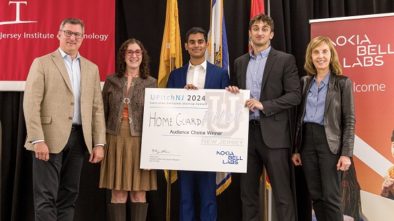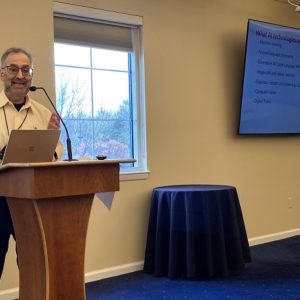How NJIT Teamed Up with Ben-Gurion University of the Negev to Create the Institute for Future Technologies
On March 16, Gov. Phil Murphy looked on as NJIT president Joel S. Bloom and Daniel Chamovitz, president of Ben-Gurion University of the Negev, signed a memorandum of understanding linking the two schools in an agreement centered around cyber technologies and environmental engineering.
The MOU created the Institute for Future Technologies, a joint effort to develop new technologies, research and academic programs at the graduate level. It also involves commercialization of the technologies created by the joint program.
The Institute’s mission is to deliver:
- Education – Offerings ranging from dual NJIT-BGU graduate (Ph.D. and M.S./M.Sc.) degrees for local students to corporate training programs.
- Applied Research – Opportunities for Ph.D. students and research staff, based on corporate, government and defense R&D projects and funding.
- Innovation and Entrepreneurship – Technology transfer and commercialization of R&D and other intellectual property from NJIT, BGU and other sources, including the launching of ventures and spinoffs.
In his speech, Gov. Murphy said, “This is a huge day, and I think it will have enormous implications in our aspiration to reclaim our title as the ‘innovation state.’ And I think, just as importantly, it will have enormous implications for deepening the relationship between New Jersey and the State of Israel.”
Added Bloom, “We all know today that global academic relationships produce results, an educated citizenry, the workforce we need, produce the kind of jobs we need in our nations.” This is an “opportunity to accelerate the governor’s blueprint for a fairer and stronger economy.”
The video of the signing event can be found here.
The schools will offer dual degrees and provide new research opportunities for both their students and faculties at the Institute for Future Technologies, which will be housed at NJIT in Newark and Jersey City.
The Origins of the Partnership
So how did this collaboration come about?
The first inkling began with Bloom’s trip to Israel in November 2017, when he visited BGU, Craig Gotsman, dean of NJIT’s Ying Wu College of Computing and distinguished professor, told us in an email interview. The idea evolved slowly over the years, but never really took off until Chamovitz assumed office in January 2019, he noted. At the signing event, first lady Tammy Murphy said that the MOU idea originated at a university dinner that she and the governor hosted in Israel in 2018.
The proposal moved to a new level in July 2019, when the New Jersey Economic Development Authority (NJEDA), led by CEO Tim Sullivan, and Choose New Jersey (Newark), headed by president and CEO Jose Lozano, started to push for the partnership to come about for the sake of New Jersey’s economic development, Gotsman said. Andrew Gross and Mark Levenson, representing the New Jersey-Israel Commission, entered the picture in December 2019, lending a lot of support toward making it happen. The governor himself became personally involved in October 2020, and that led to the formation of joint working teams on both sides, which eventually hammered out the MOU and the Founding Agreement, Gotsman told us.
Impact on Cybersecurity and Environmental Science Education
The agreement will have a great impact on cybersecurity, environmental science and data science education. “Israel in general, and BGU in particular, have a world-class reputation in cybersecurity, but also in cyber technologies in general,” Gotsman said. “Many of the most innovative startups in these fields originate in Israel. The BGU faculty are at the cutting-edge, and we will do well to combine some of that ‘startup nation’ knowledge and culture into all our programs (educational, research and innovation/entrepreneurship).”
One main component of the NJIT-BGU agreement is collaboration in civil and environmental engineering, including research in structures, buildings, materials, infrastructure, energy and environmentally conscious construction, water resources and air quality.
Both BGU and NJIT have considerable interest and expertise in the development of systems and materials with minimal environmental impact, and in the development, use, and regulation of natural or engineered systems for the remediation of contaminated environments (water, air, soil).
This is in addition to the design and preparation of systems for protection against earthquakes and other extreme events, including man-made and natural catastrophes. These civil engineering and infrastructure/water efforts intersect with the cybersecurity effort in protecting aquatic environments and other infrastructure systems from malicious actors and cyber attacks.
What It All Means For Current And Future Students
NJTechWeekly.com wondered what the agreement will mean for current and future NJIT students. According to Moshe Kam, dean of NJIT’s Newark College of Engineering, and professor of electrical and computer engineering, “Some students at NJIT will participate in student exchange, and may go to BGU for ‘a semester abroad.’ Some graduate students at NJIT will be part of a joint Ph.D. program with BGU, which will provide them with a co-advisor from BGU and the opportunity to spend some time doing research at BGU. Since BGU faculty would visit NJIT, some students at NJIT may be able to attend lectures and seminars given by BGU faculty.”
According to the Gotsman, the first research collaborations have already been formed. “We have launched 12 joint research projects in cyber technologies. We expect to launch the first joint M.S. degree in January 2022. A joint Ph.D. program is also expected to launch soon. Innovation and entrepreneurship activities will start in September 2021.”
Kam added, “In the areas of civil and environmental engineering, we expect joint projects conducted by faculty members at NJIT and BGU to be in place by September 2021 through a seed grant initiative. Faculty exchange will probably start in 2022.”
For more on this collaboration, please see this article written by our colleagues at ROI-NJ.




